#Cathedral of Our Lady of the Angels
Explore tagged Tumblr posts
Text
Latino Theater Company’s Free Holiday Pageant is L.A.’s Largest
For those of our readers in the Los Angeles area, the Latino Theater Company will have their annual signature holiday pageant that will have over 100 actors, singers and indigenous Aztec dancers as well as children and seniors from the Los Angeles community. It is the Los Angeles city’s largest theatrical holiday pageant and the best part about this? It’s free for the general public. Keep reading…

View On WordPress
#Cathedral of Our Lady of the Angels#Dios Inantzin#El Gallo Giro#Elia Saldana#Evelina Fernández#Holiday#José Luis Valenzuela#La Virgen de Guadalupe#Latino Theater Company#Press Release#Sal Lopez
2 notes
·
View notes
Text

A first-time Christmas mass experience for a non-Christian
0 notes
Text



0 notes
Text
Okay, so some theories/HC/thoughts (no, they're not in order, just kinda rambling as I go on) now that I watched the trailer
Within the first few seconds, it looks like we're in that small village before we get to the cathedral and I'm assuming something happened to Sophia cause why else would a amulet associated with her send us back in time (I'm still not sure what time frame it is based purely on the mammoth museum and the fact P now has a gun for both his arm and blade)
I am a little curious about there being a possibly kitten Spring(? that is the cat's name that hangs around the hotel, yeah?) and possibly a busy Hotel Krat, so I'm wondering how old it is Spring(?) in the main game cause that should help with the time frame
The fact that there is a small family of foxes might mean we see the Fox Stalker as a kid later and the person in red might have been a inspiration to her (ie family member, the legendary Stalker herself (the one who was also a huge influence/inspiration for Carlo) or Lady Antonia)
The fact we still have Gemini with us is a bit interesting I seriously hope we have more lore for him cause while on our way to fight the black rabbit brotherhood again he said a very curious line that makes me think he might have a more serious role possibly leading up to Carlos death
The carnival is up and running, so maybe a few years before Carlo died?
The lady controlling that angel like puppet she might have the petrification disease or whatever cause the carcass infection, but it's in the very early stages cause she able to control that puppet very well like Geppetto did with the Nameless Puppet and she seems like a very interesting boss fight and she also has complete control over those blue strings and she might be a combination of Romeo and NPs boss fight but more unfair cause 2vs1 if we don't have a specter/ally with us
The one wing angel coming back wasn't on my list of enemies/bosses coming back (if that is him)
Ice like chamber then a switch to assumingly wax (?) Dripping onto a statue is a bit unnerving so I'm curious is there is a possible connection to the cathedral and whatever has the ice chamber area
The person in red (I'm not gonna assume shit till I hear them talk or they give some hint of who they are) doesn't seem to trust anyone, especially P but I mean fair enough but they're also carrying Gemini but he's off so I'm assuming they (the Stalker) might have been the one who sped up Carlos death or is trying to find a way to prevent it if they are the Stalker from Carlos memory on the beach
We get a few new weapons and arms (I so far see no lightweight/fast swords, but I could be wrong) like the bow and arrow, the wolverine like arm/blades, a whole lotta greatswords, a gunblade (it looks familiar but I'm forgetting where I've seen that one before) and a fucking shotgun arm I'm hoping we can carry over the weapons over to the main game cause it would be so cool to have some of them in boss fights
Why is there a shark and is it possible to be a Megalodon? Looks sick af though can't wait to get my ass handed to me by a fucking shark
The outfits are suiting, considering the conditions he looks so cute with that raccoon hat all nice and warm, and I'm hoping Alidoro was the one to give him the outfits cause the fur is nice for the snow but the black and red outfit slaps
Some final thoughts before I go to bed
I'm assuming it's set a few years (or days) before Carlo died (based purely on the line of not going to make it in time or something similar to it) we might meet the legendary Stalker herself there is surprisingly no Romeo I'm curious on how it's gonna end and speaking of endings which ending is this based off of or do we wait for the sequel to figure that out? Also, where's Dorothy like you can't hint her and then just forget about her (watch the legendary Stalker is Dorothy and somehow has time traveling abilities)
I sadly won't be able to play it when it comes out possibly due to me moving so I might be late to the party FYI
#lies of p#lop spoilers#lies of p overture#long post#sleep deprived thoughts#overworked as well#im so curious
6 notes
·
View notes
Text


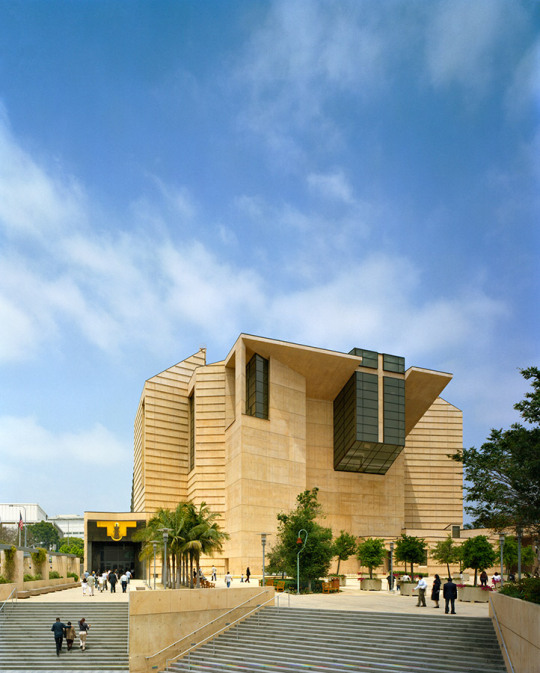

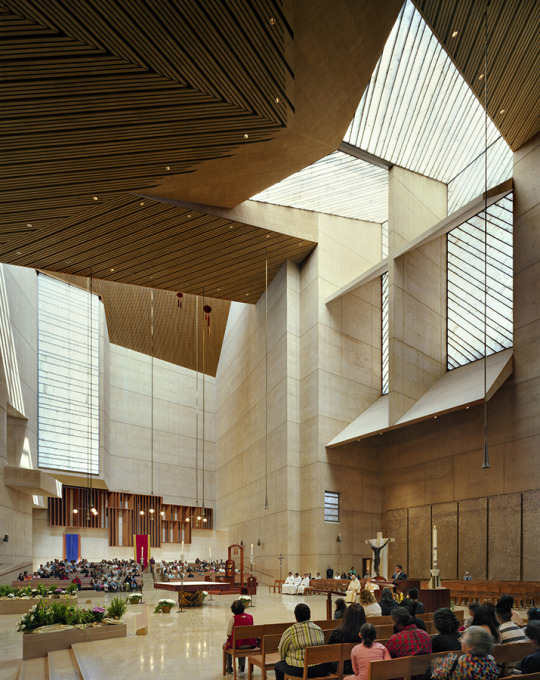

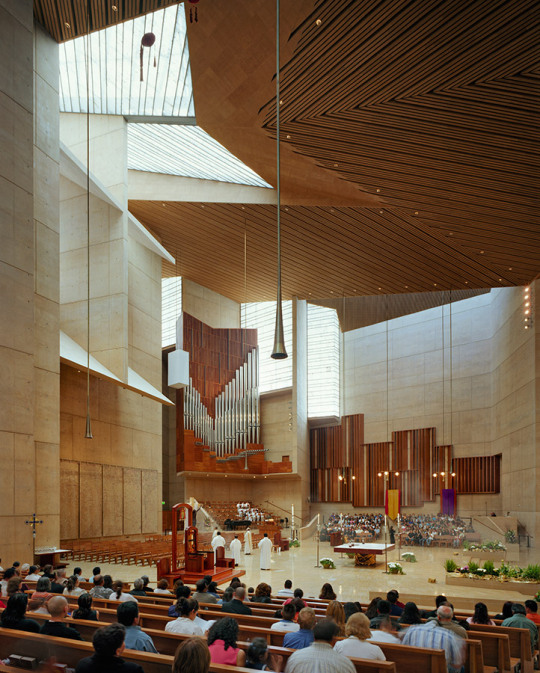
Cathedral of our Lady of the Angels, Los Angeles - Raphael Moneo
#Raphael Moneo#architecture#design#building#modern architecture#interiors#concrete#geometric#cathedral#religious architecture#beautiful spaces#cool design#los angeles#america#spanish architecture#timber#stone#stained glass#angles#beautiful buildings
48 notes
·
View notes
Text


“ And the name of the virgin was Mary. " (St. Luke 1:27)
In this simple phrase, St. Luke sums up the greatness of Mary, as epitomized in her holy name. The name of Mary was chosen by the Almighty God for the masterpiece of His creation, the Mother of His Divine Son, and was revealed to Sts. Anne and Joachim, Mary's parents by the Angel Gabriel.
The feast in Honor of Holy Name of the Blessed Virgin Mary originated in Spain and was approved by the Holy See in 1513. Pope Innocent XI extended its observance to the whole Church in 1683 in thanksgiving to our Lady for the victory on September 12, 1683, by John Sobieski, king of Poland, over the Turks, who besieged Vienna.
The Council of Ephesus in 431 taught that the Blessed Virgin Mary was properly called the "Mother of God" or "God-Bearer" (Theotokos). By the sixth century, the angelic greeting in Luke 1:28 was commonly used as a prayer, "Hail, Mary, full of grace, the Lord is with you!" By the fourteenth century, the second part of the Hail Mary prayer was often used in conjunction, "Holy Mary, Mother of God, pray for us sinners, now and at the hour of our death." In the sixteenth century, the Council of Trent, in its catechism, formally recommended this entire prayer, as we have it today, to the faithful.
St. Louis de Montfort said, "The whole world is filled with her glory, and this is especially true of Christian peoples, who have chosen her as guardian and protectress of kingdoms, provinces, dioceses, and towns. Many cathedrals are consecrated to God in her name. There is no church without an altar dedicated to her, no country or region without at least one of her miraculous images where all kinds of afflictions are cured and all sorts of benefits received. Many are the confraternities and associations honoring her as patron; many are the orders under her name and protection; many are the members of sodalities and religious of all congregations who voice her praises and make known her compassion. There is not a child who does not praise her by lisping a 'Hail Mary.' There is scarcely a sinner, however, hardened, who does not possess some spark of confidence in her. The very devils in hell, while fearing her, show her respect."
Prayer in Honor of the Name of Mary by St. Alphonsus de Ligouri
O great Mother of God and my Mother Mary, it is true that I am unworthy to name thee; but thou, who lovest me and desirest my salvation, must, notwithstanding the impurity of my tongue, grant that I may always invoke thy most holy and powerful name in my aid, for thy name is the succor of the living, and the salvation of the dying. Ah, most pure Mary, most sweet Mary, grant that henceforth thy name may be the breath of my life. O Lady, delay not to help me when I invoke thee, for in all the temptations which assail me, and in all my wants, I will never cease calling upon thee, and repeating again and again, Mary, Mary. Thus it is that I hope to act during my life, and more particularly at death, that after that last struggle, I may eternally praise thy beloved name in heaven, O clement, O pious, O sweet Virgin Mary. Amen.
#catholic faith#catholic#catholic life#catholic church#catholic tradition#mother mary#our lady#family prayer#catholic saints
7 notes
·
View notes
Text

Yesterday was a busy day. I took AMTRAK to Yorba Linda to attend the monthly piano meetup. We all did our recitals and it was a lot of fun. I played Mozart's second movement of Sonata No. 2 in F major, K 280 on the 2 year old ESTONIA grand piano and it felt so good I took advantage of the break and tried out my repetoire. Then I got back on the train and as I arrived at Union Station I got a text from Yutaka San regarding the night's Kontrapunktus baroque performance at the Cathedral of Our Lady of the Angels just a stone throw away. So I caught a Lyft ride and got to see the concert. I had originally forgotten all about this and was about to go to Kushi Shabu for dinner. So after the concert, I walked to Wellercourt and had my pork shabu just before they closed. A very busy but productive day!
Michael and Dennis playing Chopin's sole Cello Concerto
Yorba Linda
Charcoal and Gouache
A4 Maruman sketchpad
Sketched live on location from 2:19 PM to 2:55 PM
Sunday March 23 2025
2 notes
·
View notes
Text
Poorly Summarized WIP Tag
thanks for the tag @the-golden-comet!
Our Lonely Ocean:
Fantasy romance where closeted a prince comes to an island kingdom to become a squire, where he meets two really odd companions and an even more closeted knight who’s getting married in two months. They get along…ok at first, but will they overcome their rivalry whilst protecting the islands from invasive beas- oop nvm they’re fucking.
Altered_Humanity (AUGMENTED HUMANITY IS BACK BABY WOOOO)
Android wakes up in an overgrown post apocalyptic world and finds out magic exists now whoops. Turns out it was real all along and has suddenly returned in full swing (including giant cathedrals that can be seen from orbit). So said android had her arm replaced with that of her dead human wife who could use magic blah blah blah. Now she has to stop some eldritch elf twink from destroying all that remains of the old world with the help of an annoying hacker and a golem without a tongue.
Viscered:
Single dad who’s actually an escaped bio weapon is like one bad day from killing himself after the death of his wife, but he has a 10 month old son to take care of. Oh, also the government wants their super weapon back.
Loop of the Hollow:
Man that small town in southwest Texas sure is racist. And haunted, like, extremely haunted.
LunuL:
Three bounty hunters in the late 22nd century. Earth was overtaken by a prehistoric pathogen, humanity lives on mars now, aliens exist, you get the gist. Said bounty hunters don’t pay their rent in time and The Horrors TM ensue due to their landlord being a powerful crime boss. Also eyes. Loooooots of eyes. We’ve got a nerd who hates how light sounds, a former soldier who is surprisingly happy despite everything, and Astra, with whatever the fuck she’s got going on. And of course, they each have enough emotional baggage to drag down a plane.
Shadows Over Novald:
Urban Dark Fantasy. Murder Crime Soulmates are about to ditch Gotham but 10 times worse, when the god of death shrouds the city in darkness and asks everyone to find and kill five magic wielding humans in the city or else everyone dies to the undead. While this is happening, the most dysfunctional detectives ever are trying to find another way to break the curse.
WanderStruck: Nephew of closeted knight from before is ALSO getting forcefully married when he and his half sister suddenly get pulled through reality and into…modern day Los Angeles? So now they’re trying to find a way home with the help of some nerd who just wanted an internship at a cool tech company. He had no clue they did multiversal travel and just wanted to type at a desk.
Tales of the Sculpted Lands: A dark fantasy anthology about a land sculpted from primordial clay. It’s a dying, complicated world full of complicated people with complicated problems. Some tales are more adventurous and end happily, others absolutely don’t.
Grayguard: Ah shit I spilled my TOTK copy and my cup of Jujutsu Kaisen. Fantasy world where all magical aspects fall under chaos or order. Humans, animals, and elves are the only exception. Each major kingdom has a guild, one being the Grayguard, who’s leader is the strongest warrior in the land. Everything falls apart when a mysterious demon with magic robots kidnaps her. Now her students have to stumble their way into rescuing her and stopping the major kingdoms from imploding, all while old threats from their leader’s past begin to rear their ugly heads.
And last but not least: Chaos Travelers
The least deranged and unhinged fantasy motley crew come to the island kingdom from before to stop a doomsday cult from resurrecting the god of chaos. Hilarity and angst ensues. Our glorified D&D party includes a humanoid dragon bard with a southern accent, a runaway from said doomsday cult, a cat lady with magic paint who may or may not have sold her soul, and a mute knight with WAY too many knives.
Tagging @mk-writes-stuff @willtheweaver @alinacapellabooks @frostedlemonwriter + open tag!
6 notes
·
View notes
Note
woe, the entirety of 'the happy prince' be upon ye!! :)
High above the city, on a tall column, stood the statue of the Happy Prince. He was gilded all over with thin leaves of fine gold, for eyes he had two bright sapphires, and a large red ruby glowed on his sword-hilt.
He was very much admired indeed. “He is as beautiful as a weathercock,” remarked one of the Town Councillors who wished to gain a reputation for having artistic tastes; “only not quite so useful,” he added, fearing lest people should think him unpractical, which he really was not.
“Why can’t you be like the Happy Prince?” asked a sensible mother of her little boy who was crying for the moon. “The Happy Prince never dreams of crying for anything.”
“I am glad there is some one in the world who is quite happy,” muttered a disappointed man as he gazed at the wonderful statue.
“He looks just like an angel,” said the Charity Children as they came out of the cathedral in their bright scarlet cloaks and their clean white pinafores.
“How do you know?” said the Mathematical Master, “you have never seen one.”
“Ah! but we have, in our dreams,” answered the children; and the Mathematical Master frowned and looked very severe, for he did not approve of children dreaming.
One night there flew over the city a little Swallow. His friends had gone away to Egypt six weeks before, but he had stayed behind, for he was in love with the most beautiful Reed. He had met her early in the spring as he was flying down the river after a big yellow moth, and had been so attracted by her slender waist that he had stopped to talk to her.
“Shall I love you?” said the Swallow, who liked to come to the point at once, and the Reed made him a low bow. So he flew round and round her, touching the water with his wings, and making silver ripples. This was his courtship, and it lasted all through the summer.
“It is a ridiculous attachment,” twittered the other Swallows; “she has no money, and far too many relations”; and indeed the river was quite full of Reeds. Then, when the autumn came they all flew away.
After they had gone he felt lonely, and began to tire of his lady-love. “She has no conversation,” he said, “and I am afraid that she is a coquette, for she is always flirting with the wind.” And certainly, whenever the wind blew, the Reed made the most graceful curtseys. “I admit that she is domestic,” he continued, “but I love travelling, and my wife, consequently, should love travelling also.”
“Will you come away with me?” he said finally to her; but the Reed shook her head, she was so attached to her home.
“You have been trifling with me,” he cried. “I am off to the Pyramids. Good-bye!” and he flew away.
All day long he flew, and at night-time he arrived at the city. “Where shall I put up?” he said; “I hope the town has made preparations.”
Then he saw the statue on the tall column.
“I will put up there,” he cried; “it is a fine position, with plenty of fresh air.” So he alighted just between the feet of the Happy Prince.
“I have a golden bedroom,” he said softly to himself as he looked round, and he prepared to go to sleep; but just as he was putting his head under his wing a large drop of water fell on him. “What a curious thing!” he cried; “there is not a single cloud in the sky, the stars are quite clear and bright, and yet it is raining. The climate in the north of Europe is really dreadful. The Reed used to like the rain, but that was merely her selfishness.”
Then another drop fell.
“What is the use of a statue if it cannot keep the rain off?” he said; “I must look for a good chimney-pot,” and he determined to fly away.
But before he had opened his wings, a third drop fell, and he looked up, and saw—Ah! what did he see?
The eyes of the Happy Prince were filled with tears, and tears were running down his golden cheeks. His face was so beautiful in the moonlight that the little Swallow was filled with pity.
“Who are you?” he said.
“I am the Happy Prince.”
“Why are you weeping then?” asked the Swallow; “you have quite drenched me.”
“When I was alive and had a human heart,” answered the statue, “I did not know what tears were, for I lived in the Palace of Sans-Souci, where sorrow is not allowed to enter. In the daytime I played with my companions in the garden, and in the evening I led the dance in the Great Hall. Round the garden ran a very lofty wall, but I never cared to ask what lay beyond it, everything about me was so beautiful. My courtiers called me the Happy Prince, and happy indeed I was, if pleasure be happiness. So I lived, and so I died. And now that I am dead they have set me up here so high that I can see all the ugliness and all the misery of my city, and though my heart is made of lead yet I cannot chose but weep.”
“What! is he not solid gold?” said the Swallow to himself. He was too polite to make any personal remarks out loud.
“Far away,” continued the statue in a low musical voice, “far away in a little street there is a poor house. One of the windows is open, and through it I can see a woman seated at a table. Her face is thin and worn, and she has coarse, red hands, all pricked by the needle, for she is a seamstress. She is embroidering passion-flowers on a satin gown for the loveliest of the Queen’s maids-of-honour to wear at the next Court-ball. In a bed in the corner of the room her little boy is lying ill. He has a fever, and is asking for oranges. His mother has nothing to give him but river water, so he is crying. Swallow, Swallow, little Swallow, will you not bring her the ruby out of my sword-hilt? My feet are fastened to this pedestal and I cannot move.”
“I am waited for in Egypt,” said the Swallow. “My friends are flying up and down the Nile, and talking to the large lotus-flowers. Soon they will go to sleep in the tomb of the great King. The King is there himself in his painted coffin. He is wrapped in yellow linen, and embalmed with spices. Round his neck is a chain of pale green jade, and his hands are like withered leaves.”
“Swallow, Swallow, little Swallow,” said the Prince, “will you not stay with me for one night, and be my messenger? The boy is so thirsty, and the mother so sad.”
“I don’t think I like boys,” answered the Swallow. “Last summer, when I was staying on the river, there were two rude boys, the miller’s sons, who were always throwing stones at me. They never hit me, of course; we swallows fly far too well for that, and besides, I come of a family famous for its agility; but still, it was a mark of disrespect.”
But the Happy Prince looked so sad that the little Swallow was sorry. “It is very cold here,” he said; “but I will stay with you for one night, and be your messenger.”
“Thank you, little Swallow,” said the Prince.
So the Swallow picked out the great ruby from the Prince’s sword, and flew away with it in his beak over the roofs of the town.
He passed by the cathedral tower, where the white marble angels were sculptured. He passed by the palace and heard the sound of dancing. A beautiful girl came out on the balcony with her lover. “How wonderful the stars are,” he said to her, “and how wonderful is the power of love!”
“I hope my dress will be ready in time for the State-ball,” she answered; “I have ordered passion-flowers to be embroidered on it; but the seamstresses are so lazy.”
He passed over the river, and saw the lanterns hanging to the masts of the ships. He passed over the Ghetto, and saw the old Jews bargaining with each other, and weighing out money in copper scales. At last he came to the poor house and looked in. The boy was tossing feverishly on his bed, and the mother had fallen asleep, she was so tired. In he hopped, and laid the great ruby on the table beside the woman’s thimble. Then he flew gently round the bed, fanning the boy’s forehead with his wings. “How cool I feel,” said the boy, “I must be getting better”; and he sank into a delicious slumber.
Then the Swallow flew back to the Happy Prince, and told him what he had done. “It is curious,” he remarked, “but I feel quite warm now, although it is so cold.”
“That is because you have done a good action,” said the Prince. And the little Swallow began to think, and then he fell asleep. Thinking always made him sleepy.
When day broke he flew down to the river and had a bath. “What a remarkable phenomenon,” said the Professor of Ornithology as he was passing over the bridge. “A swallow in winter!” And he wrote a long letter about it to the local newspaper. Every one quoted it, it was full of so many words that they could not understand.
“To-night I go to Egypt,” said the Swallow, and he was in high spirits at the prospect. He visited all the public monuments, and sat a long time on top of the church steeple. Wherever he went the Sparrows chirruped, and said to each other, “What a distinguished stranger!” so he enjoyed himself very much.
When the moon rose he flew back to the Happy Prince. “Have you any commissions for Egypt?” he cried; “I am just starting.”
“Swallow, Swallow, little Swallow,” said the Prince, “will you not stay with me one night longer?”
“I am waited for in Egypt,” answered the Swallow. “To-morrow my friends will fly up to the Second Cataract. The river-horse couches there among the bulrushes, and on a great granite throne sits the God Memnon. All night long he watches the stars, and when the morning star shines he utters one cry of joy, and then he is silent. At noon the yellow lions come down to the water’s edge to drink. They have eyes like green beryls, and their roar is louder than the roar of the cataract.”
“Swallow, Swallow, little Swallow,” said the Prince, “far away across the city I see a young man in a garret. He is leaning over a desk covered with papers, and in a tumbler by his side there is a bunch of withered violets. His hair is brown and crisp, and his lips are red as a pomegranate, and he has large and dreamy eyes. He is trying to finish a play for the Director of the Theatre, but he is too cold to write any more. There is no fire in the grate, and hunger has made him faint.”
“I will wait with you one night longer,” said the Swallow, who really had a good heart. “Shall I take him another ruby?”
“Alas! I have no ruby now,” said the Prince; “my eyes are all that I have left. They are made of rare sapphires, which were brought out of India a thousand years ago. Pluck out one of them and take it to him. He will sell it to the jeweller, and buy food and firewood, and finish his play.”
“Dear Prince,” said the Swallow, “I cannot do that”; and he began to weep.
“Swallow, Swallow, little Swallow,” said the Prince, “do as I command you.”
So the Swallow plucked out the Prince’s eye, and flew away to the student’s garret. It was easy enough to get in, as there was a hole in the roof. Through this he darted, and came into the room. The young man had his head buried in his hands, so he did not hear the flutter of the bird’s wings, and when he looked up he found the beautiful sapphire lying on the withered violets.
“I am beginning to be appreciated,” he cried; “this is from some great admirer. Now I can finish my play,” and he looked quite happy.
The next day the Swallow flew down to the harbour. He sat on the mast of a large vessel and watched the sailors hauling big chests out of the hold with ropes. “Heave a-hoy!” they shouted as each chest came up. “I am going to Egypt”! cried the Swallow, but nobody minded, and when the moon rose he flew back to the Happy Prince.
“I am come to bid you good-bye,” he cried.
“Swallow, Swallow, little Swallow,” said the Prince, “will you not stay with me one night longer?”
“It is winter,” answered the Swallow, “and the chill snow will soon be here. In Egypt the sun is warm on the green palm-trees, and the crocodiles lie in the mud and look lazily about them. My companions are building a nest in the Temple of Baalbec, and the pink and white doves are watching them, and cooing to each other. Dear Prince, I must leave you, but I will never forget you, and next spring I will bring you back two beautiful jewels in place of those you have given away. The ruby shall be redder than a red rose, and the sapphire shall be as blue as the great sea.”
“In the square below,” said the Happy Prince, “there stands a little match-girl. She has let her matches fall in the gutter, and they are all spoiled. Her father will beat her if she does not bring home some money, and she is crying. She has no shoes or stockings, and her little head is bare. Pluck out my other eye, and give it to her, and her father will not beat her.”
“I will stay with you one night longer,” said the Swallow, “but I cannot pluck out your eye. You would be quite blind then.”
“Swallow, Swallow, little Swallow,” said the Prince, “do as I command you.”
So he plucked out the Prince’s other eye, and darted down with it. He swooped past the match-girl, and slipped the jewel into the palm of her hand. “What a lovely bit of glass,” cried the little girl; and she ran home, laughing.
Then the Swallow came back to the Prince. “You are blind now,” he said, “so I will stay with you always.”
“No, little Swallow,” said the poor Prince, “you must go away to Egypt.”
“I will stay with you always,” said the Swallow, and he slept at the Prince’s feet.
All the next day he sat on the Prince’s shoulder, and told him stories of what he had seen in strange lands. He told him of the red ibises, who stand in long rows on the banks of the Nile, and catch gold-fish in their beaks; of the Sphinx, who is as old as the world itself, and lives in the desert, and knows everything; of the merchants, who walk slowly by the side of their camels, and carry amber beads in their hands; of the King of the Mountains of the Moon, who is as black as ebony, and worships a large crystal; of the great green snake that sleeps in a palm-tree, and has twenty priests to feed it with honey-cakes; and of the pygmies who sail over a big lake on large flat leaves, and are always at war with the butterflies.
“Dear little Swallow,” said the Prince, “you tell me of marvellous things, but more marvellous than anything is the suffering of men and of women. There is no Mystery so great as Misery. Fly over my city, little Swallow, and tell me what you see there.”
So the Swallow flew over the great city, and saw the rich making merry in their beautiful houses, while the beggars were sitting at the gates. He flew into dark lanes, and saw the white faces of starving children looking out listlessly at the black streets. Under the archway of a bridge two little boys were lying in one another’s arms to try and keep themselves warm. “How hungry we are!” they said. “You must not lie here,” shouted the Watchman, and they wandered out into the rain.
Then he flew back and told the Prince what he had seen.
“I am covered with fine gold,” said the Prince, “you must take it off, leaf by leaf, and give it to my poor; the living always think that gold can make them happy.”
Leaf after leaf of the fine gold the Swallow picked off, till the Happy Prince looked quite dull and grey. Leaf after leaf of the fine gold he brought to the poor, and the children’s faces grew rosier, and they laughed and played games in the street. “We have bread now!” they cried.
Then the snow came, and after the snow came the frost. The streets looked as if they were made of silver, they were so bright and glistening; long icicles like crystal daggers hung down from the eaves of the houses, everybody went about in furs, and the little boys wore scarlet caps and skated on the ice.
The poor little Swallow grew colder and colder, but he would not leave the Prince, he loved him too well. He picked up crumbs outside the baker’s door when the baker was not looking and tried to keep himself warm by flapping his wings.
But at last he knew that he was going to die. He had just strength to fly up to the Prince’s shoulder once more. “Good-bye, dear Prince!” he murmured, “will you let me kiss your hand?”
“I am glad that you are going to Egypt at last, little Swallow,” said the Prince, “you have stayed too long here; but you must kiss me on the lips, for I love you.”
“It is not to Egypt that I am going,” said the Swallow. “I am going to the House of Death. Death is the brother of Sleep, is he not?”
And he kissed the Happy Prince on the lips, and fell down dead at his feet.
At that moment a curious crack sounded inside the statue, as if something had broken. The fact is that the leaden heart had snapped right in two. It certainly was a dreadfully hard frost.
Early the next morning the Mayor was walking in the square below in company with the Town Councillors. As they passed the column he looked up at the statue: “Dear me! how shabby the Happy Prince looks!” he said.
“How shabby indeed!” cried the Town Councillors, who always agreed with the Mayor; and they went up to look at it.
“The ruby has fallen out of his sword, his eyes are gone, and he is golden no longer,” said the Mayor in fact, “he is little better than a beggar!”
“Little better than a beggar,” said the Town Councillors.
“And here is actually a dead bird at his feet!” continued the Mayor. “We must really issue a proclamation that birds are not to be allowed to die here.” And the Town Clerk made a note of the suggestion.
So they pulled down the statue of the Happy Prince. “As he is no longer beautiful he is no longer useful,” said the Art Professor at the University.
Then they melted the statue in a furnace, and the Mayor held a meeting of the Corporation to decide what was to be done with the metal. “We must have another statue, of course,” he said, “and it shall be a statue of myself.”
“Of myself,” said each of the Town Councillors, and they quarrelled. When I last heard of them they were quarrelling still.
“What a strange thing!” said the overseer of the workmen at the foundry. “This broken lead heart will not melt in the furnace. We must throw it away.” So they threw it on a dust-heap where the dead Swallow was also lying.
“Bring me the two most precious things in the city,” said God to one of His Angels; and the Angel brought Him the leaden heart and the dead bird.
“You have rightly chosen,” said God, “for in my garden of Paradise this little bird shall sing for evermore, and in my city of gold the Happy Prince shall praise me.”
Well you see @berkeley-mews, you may have principals and not post my annoying spam, but I do not.
Mutuals, attack this harasser!!!!!!!
#/lh /lh /lh /lh#if someone who isnt v reads this v is my best friend dont be mean to her#is mise an crann#asks#anon asks#v tag#because we all know who this is#long post#very. very long post
6 notes
·
View notes
Text


No. 6: Cathedral of our Lady of Angels by Rafael Moneo. 2002. Los Angeles, CA.
2 notes
·
View notes
Text
Day 24 - 4 May Calzadilla de los Hermanillos 17.9km
This was the day that changed everything. We set off at just before 7 for a quick cup of coffee at the local albergue and we said our goodbyes to all our Camino family. It would be a long day for us and we had sent our packs on ahead.
But very soon a niggling pain in my ankle became much worse. With hindsight when I stopped to put some gel on I should have turned back and ordered a taxi but hindsight is great.
We walked with Jenny and Mel and they were great company. Really kept things upbeat. The road we are walking on is the longest stretch of Roman road in Spain - so we are following in the footsteps of Emperor Augustus. The road is flat and straight of course. Good old Romans.

We passed some very cute calfs.
Along the way we saw these weird structures. Carrie wondered if they were wine cellars but apparently people live in them - they are underground houses.
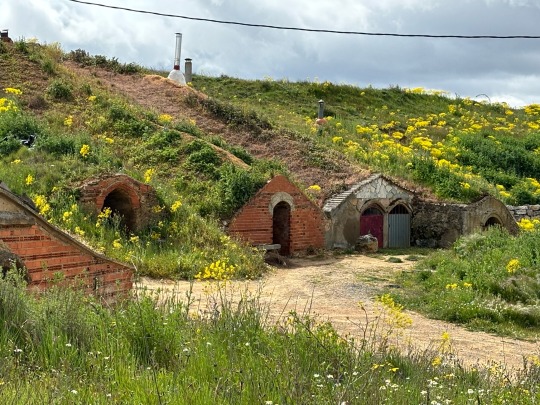
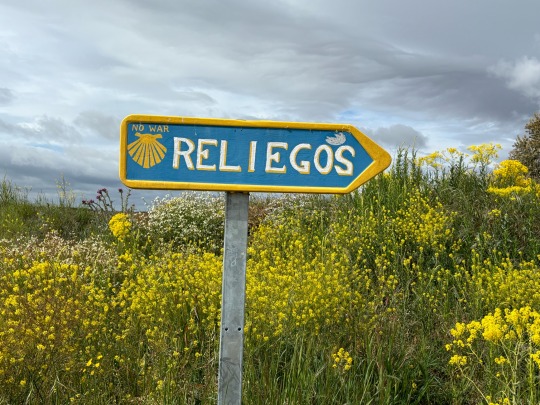
But I was limping badly and the relief at seeing the sign for Reliegos! I sat outside a closed cafe on a chair while Carrie went to find something open. Eventually we found an Albergue and he ordered us a taxi. We waited half an hour for it - I was literally dozing off waiting for having dosed up on ibuprofen and paracetamol! I had decided realising how bad it was to seek medical advice and the nearest centre was Leon.
The taxi duly arrived - lady driver who had her young daughter with her in the front. She was wonderful. Took us to pick up our backpacks at the Albergue in Mansilla Mayor then onward to Leon.
On the way I managed to book a room for Carrie and I for the night. We got to Leon, dropped our bags off at the hotel and went to the local pharmacy.
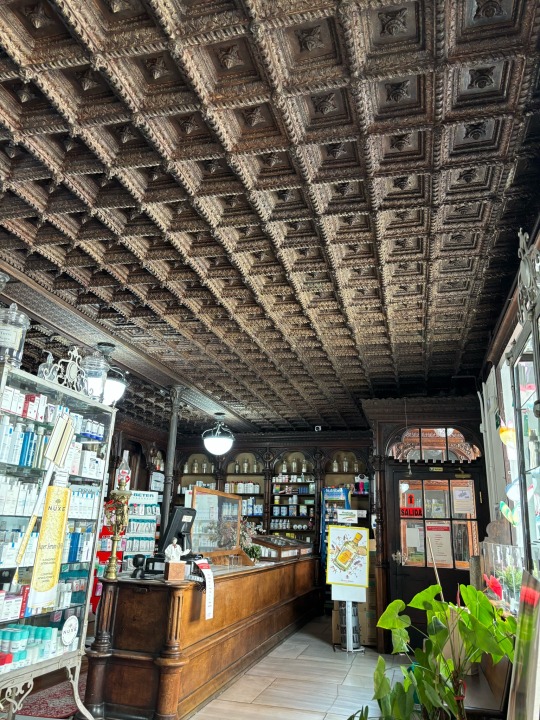
The interior of the pharmacy was amazing - it was obviously a really old building. The chap who served me was useless - sold me some tablets to reduce the inflammation and told me to ice it. When I asked about strapping it he tried to sell me some bandages. Not being a first aid nurse I declined.
He did write down the name of the local ‘private’ medical centre - turned out to be a 3 minute walk from our hotel. I left Carrie to walk over there. The centre really catered for foreigners - the receptionist rang for an interpreter. I paid a set amount - but when she realised I was a pilgrim I got a massive discount! Eventually got to see a doctor/x ray etc and a prescription for anti-inflammatories and a super strength gel. Angel Carrie went off to get the drugs while I stayed in the hotel.
Carrie sourced some ice - she has been super nurse/mum!
We had pasta at a very busy restaurant right on the Cathedral square and it was excellent.
So here we are - poor Carrie is coming down with a cold and I am limping. Feels very strange - its almost the exact stage Jane tore her ligament last year and I am sure its the same clinic she went to.
So the plan for me is to rest up. I have cancelled our booking for accommodation on Tuesday at Villar de Mazarife and booked my original apartment for 3 nights rather than two. Fingers crossed.
6 notes
·
View notes
Text
It's like a ballet
Summary:
In 1650 London, in a territory divided by war between the English and the Scots, Aziraphale gets into trouble but finds a way to make Crowley forgive him again and again. Notes:
AVAUNT! If you are Neil Gaiman. Sorry Sir, we wan't risk any danger. For everyone: WELCOME! Fanfiction written by me, illustrated by Nica @the-curious-lady-blog (@nicachan91 on Twitter). We are Italian, English is not our first language. Feel free to send suggestions for improvements. Thank you for taking the time to read this attempt to spread joy.
Words:2,210
On AO3
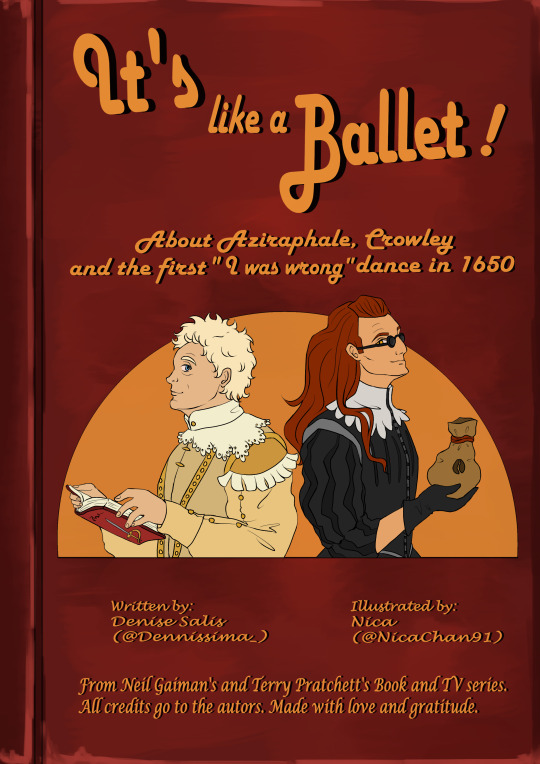
LONDON 1650
OLD ST PAUL’S CATHEDRAL - August 31st.
Aziraphale never misses a chance to wander among the bookbinders' and booksellers' shops in the precincts of Saint Paul's Cathedral, looking for new publications or some rare volumes. He loves wandering through the crowds, and mingling among the people gives him a sense of security. That's why it seems the best place for him to meet Crowley. Just as he is turning a freshly printed volume over in his hands, admiring its fine binding, Crowley approaches him with a wary eye.
‘I’m back.’
‘How did it go? Were you... successful?’
‘Yes, let's say so. I brought some supplies with me. Would you…like?'
Aziraphale gazes at Crowley with a side eye, commenting with his best intrigued expression.
‘Oh Crowley, I'm still not clear if I'm allowed... I mean. The drink that the Supreme Archangel Gabriel serves to the prophets to replenish their energy for preaching...was probably stolen by...you...demons...to deconsecrate it! I shouldn’t...'
Crowley rolls his eyes upwards.
‘Angel, I came all the way to Venice to get this…’, and pats his hand on his hip, making a dull noise against the packet he was hiding under the fabric of his clothes. He continues, showing his teeth. ‘Don't you think that if it was sacrilege they wouldn't have allowed a coffee shop to open in one of the major capitals of the Mediterranean?’
Aziraphale mumbles unconvinced. Then he smiles and raises an arm to attract the dealer's attention and buy the book he was clutching tightly in his hands, fearing that someone else was interested in buying it. Crowley follows him as he makes his way through the throng of voices. He approaches his shoulder to discreetly continue his speech.
'I was wondering... if you could... well... keep... for me... on your property, my coffee.’
He ends quickly and with a cough.
Aziraphale turns away.
‘Me? Hold the sinful drink? Why can't you keep it yourself?’
Crowley wrinkles his nose and snorts: ‘Mala tempora current.’
Aziraphale sighs. ‘Yes, it's a bad time for everyone, with the civil war, the court in check... and that Cromwell…’. He shoots Crowley a sidelong glance ‘Wait, aren't you the one behind all this?’
Crowley looks at him indignantly ‘Of course not! Mala tempora current, is the last dispatch I received from Hell. You know how they are over there. They liked when human use to speak Latin, they find it easy, not like Babylonian. They adopted it as a kind of official language... if you want to make a communication to Hell and get attention you have to use Latin. Send dispatches? Latin. Summon a demon? Latin. Exorcise a demon? Latin. I try to tell them that things change quickly here but they don't want to know….'
Aziraphale was leading him out of the crowd. 'All right, my dear, but why do I have to hold your coffee?’
‘Mala tempora current, I said, is the dispatch requesting my presence in Scotland, I must return immediately to Dunbar…'
‘Ah, some mortally evil temptation…'
‘Nah! Humans, as usual, do everything themselves. I just have to attend and make believe downstairs that I've damned a few battling souls. But I'm not going to risk my precious loot. I've done the impossible to get it’. Crowley mutters something, shaking his head.
Aziraphale looks surprised and vaguely disappointed. 'Oh. Oh. So you're leaving London again. All right, all right. I was hoping you could be my godfather, but I'll ask Mr Perroy, my estate neighbour... You know I bought some land just outside London, right?’
‘Yes, of course I know it and... wait! Godfather? For what? - Crowley returned to attention, seeking Aziraphale's gaze. - Not for what I think! Angel! Don't tell me you challenged someone to a duel!’
His tone had become abrupt, almost aggressive.
Aziraphale's face lights up and he replies all happy. ‘No no! ...It was he who challenged me! Isn't it exciting?’. He would have clapped his hands if he hadn’t occupied them with the books he had bought.
Crowley grunts, bringing a hand to his forehead. ‘You don't realise, Angel.’
‘But Crowley, why? This is so exciting! Like the old days, a matter of honour…’. Aziraphale gloats. Crowley becomes exasperatedly irritated.
‘You do not understand! You risk being discorporated. Duels nowadays can be deadly! There is no more chivalry and they are not regulated by law. Who challenged you? Why? What are you accused of?’
Aziraphale is embarrassed and starts telling the story from the beginning, babbling, talking about angels, demons, miracles, temptations. ‘Oh, damn, keep it short!’
Aziraphale tells all in one breath, doe-eyed: ‘As it happens, I performed a few miracles here and there, at court and in Parliament, to convince a few people not to fight and they deserted. Let's just say that the two factions didn't take it very well and since they managed to trace me as a common acquaintance, Lord Romford accused me of espionage and of being a double agent. He demanded satisfaction…'
Crowley grunts, trying to contain his anger.
‘I. Had. Told. You. To stay out of it! I know this sort of thing. When humans are intent on making war on each other there is no miracle that saves them or temptation that makes things worse.’
He snorts, trying to regain control of his tone of voice.
‘I'm trying to find out about this Romford. You do what you can to avoid the duel and…'
‘I have already accepted!’, Aziraphale interrupts him. Crowley grunts.
‘Well, you don't need me, you can easily defend your honor, just a little miracle and you'll be safe…’, he said trying to calm himself, first.
‘Oh, not at all! I don't want to cheat! It would not be honorable at all!’
The demon roars unnerved.
‘Come on, Crowley, it's like a ballet! Only with a rapier in hand. And it just so happens that I have right under my arm the latest and greatest fencing manuals from which I will undoubtedly learn all the secrets necessary to... Crowley?’. Out of it, the demon pulls out the packet containing the coffee, pushes it against Aziraphale's chest. 'I’d better go to Edinburgh.’
‘Crowley? Crowley! I'm talking to you, get back here!’, try to insist Aziraphale.
‘Take care…’, and with a fluttering gesture of his hand Crowley points to nothing specific and turns his back on him, leaving Aziraphale in doubt as to whether he was talking about the coffee or him.
DUNBAR - September 2nd - two days later.
Crowley wanders around the camp of the army led by Cromwell, not even bothering to pretend to be a footman or a groom. He is waiting for a demonic messenger and wants to be found concentrating on inspecting the troops, even though his thoughts are elsewhere. The moon is high in the sky when Mammon emerges from the bowels of the earth and awaits him among the roots of an ancient tree. ‘Ave Crowley!’, he calls to him as he approaches, repeating ‘Hello! Hello! Hello!’
Crowley does not wait for the messenger to take the initiative and buries him with unsolicited information.
‘Hello Mammon, it's business as usual here, the troops are ready, tomorrow the battle will rage, and if you're already wondering, I've already inspected the ranks of the Scottish royalists as well... tomorrow there will be more bloodshed than you've seen in a long time! - He sniggers, trying to disguise how much he cared more about what he was about to ask than what he was telling. ‘Instead in London, I am interested in the soul of a certain Lord….'
Mammon seemed satisfied with Crowley's account and, as ambassador of England, easily loosened his tongue. ‘Do ut des, Crowley. Your news pleases the Underworld, tomorrow we will hoard souls. But the Lord you're interested in is already damned. Romford is an arrogant blowhard, travelled the world in search of fortune and learned the art of sword fighting in Italy, before returning to England and serving in Parliament. A well-built man with a well-trained physique...a fine piece of craftsmanship damning his soul coin after coin, wouldn't you say?’
Crowley was no longer listening. Aziraphale would not stand a chance.
He feigns disappointment at having been preceded in order to quickly dismiss the host and once alone, exasperated, quickly takes his leave of the demonic envoy.
He wanders off as if to take up position with the armies and stir up the fighting, in case anyone is watching. Instead, he scurries off at a brisk pace back to London.
LONDON - September 3rd - one hour before sunrise
In the mist of a wasteland just outside London, a short distance from the banks of the Thames, the silhouettes of three men, with elegant bearing, faintly emerge. Two of them with a stiff, martial posture. The third, the less physically fit one, looks around hesitantly.
‘Well, it looks like my godfather is not coming, he must have had an impediment’
Aziraphale had not even asked Mr Perroy to be his godfather, in the vain hope that the absence of a witness might lead to the duel being cancelled. He tries his strategy but the pleading look only works with Crowley, apparently.
‘I think it is necessary to postpone, Lord Romford.’
The nobleman appears annoyed and further offended. ‘Lord Fell, this disrespect is intolerable. I consider it further proof of your cowardice and culpability. Only a spy does not even have a comrade to rely on and turn to as a witness during a duel of honour. You will meet the fate that befalls spies here and now!’
Aziraphale was about to retort something when a voice came from the fog, and slowly from the silhouettes of the trees came the slender, dark figure of a man advancing towards them.
‘Sorry, sorry, this fog makes orientation impossible.’
‘Crowley???’. Aziraphale looks displeased. Through clenched teeth he turns to his friend: ‘I was on the verge of cancelling the duel, to the detriment of my honour certainly, because of... your... absence!’
The demon looked at him bewildered, wondering there and then if he had not done better not to turn up at all, but quickly realising that, even without a witness, Aziraphale would meet his fate. And he did not even realise the danger he was facing.
Lord Romford, unscrupulous, presses to fight. His godfather thrusts a rapier into Aziraphale's hand and begins to explain the rules of the fight. Aziraphale obviously does not listen but looks at his friend, still in disbelief at his unexpected appearance, now beginning to be terrified by what awaited him.
The tension slices through. The breaking of dawn causes the fog to slowly descend on the grass.
The indomitable lord strides forward aggressively, Aziraphale stumbles, fumbles with the hilt, trying to remember what he learned in the manuals.
Exasperated Crowley makes a gesture with his hand, from the bottom upwards, invoking a small demonic miracle of succour. The bloody lord's blade becomes heavy and unmanageable. Aziraphale's blade flashes with a distracting light and becomes razor-sharp. It is Romford who spills the first blood and walks away wounded, not badly but enough to consider himself defeated and unable to continue. The angel's honour is saved.
Romford is furious. He gathers his things and vanishes with the first light of dawn, like a nightmare, followed closely by his best man.
Furious Crowley precedes Aziraphale on the road to his abode to retrieve his coffee packet. Aziraphale seems on the verge of bursting into tears, such was the tension he had to relieve. He continues to apologise but Crowley wants his coffee back so he never has to see him again. - I don't want anything more to do with you, Angel! We're done. The battle rages in Dunbar and I'm here sharpening the wrong swords! I told you to stay out of it, that it's not a game. But you, stubborn angel...
Aziraphale's languid stare is not enough this time to end the quarrel. He is more frightened now at the thought of Crowley leaving angry with him than when he was about to face the colonel's blade shortly before. He invokes the demon's forgiveness, to no avail. He must resource himself and find an expedient to dampen his anger. They walk along a dirt road and Aziraphale starts prancing around Crowley humming "You're right, you're right, I'm wrong, you're right!". He concludes with a bow, which bars Crowley's way forcing him to stop and laugh.
‘What was that?’
‘A dance, I believe.’
‘You don’t dance.’
‘I do it if necessary. It worked?’
Aziraphale steps to Crowley's side, trying to catch his facial expression in the hope of catching a hint of a smile.
‘All right, Angel. Apology accepted. But now let's go for coffee, and you… you'll drink it with me. That stuff has to work, I need the strength of forty prophets to recover and return to battle.’
From that moment on, Crowley was crazy for coffee. And for the angel's apology dances.
Aziraphale, on the other hand, did not really appreciate the strong taste of the drink stolen from the Supreme Archangel, perhaps it reminded him that he was at fault with a demon. But he said he simply preferred a good English tea.
#Good Omens#ineffable husbands#aziracrow#crowley x aziraphale#Aziraphale x crowley#good omens fanfiction#minisode#historic minisode#I was wrong dance
14 notes
·
View notes
Text
The Execution of Lady Jane Grey, Paul Delaroche, 1833, Oil on Canvas, 246 x 197cm, National Gallery, London
Masterlist
BUY ME A COFFEE
I would not do this painting justice in my analysis of the work; I doubt words can ever do justice to that which is painted. Art forces us to attach and feel whatever the artist has placed before us, to empathise and connect to its display. No painting does that, in my opinion, as much as the painting “The Execution of Lady Jane Grey”.
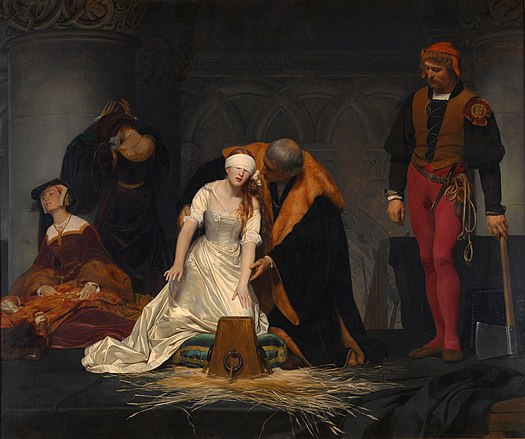
An oil painting by Paul Delaroche, painted in 1833, completed long after the actual historical events, the painting attempts to represent the historical execution of Lady Jane Grey. It has been one that I’ve seen making the rounds on many “mentally ill girlies” Instagram posts and TikToks, due to the connotations of loss of innocence and girlhood. It is a painting that has come back into circles of discussion through its ability to emotionally connect to those feelings, and its forlornness, through the delicate portrayal of Lady Jane Grey.
Historically a Protestant believer, Lady Jane Grey was dubbed the “Nine Day Queen” due to the length of her reign. Proclaimed Queen of England during the Tudor period (1485 to 1605) was overshadowed by her relatives Mary Tudor and Elizabeth I, more so by Mary Tudor, “Bloody Mary”, a Catholic, as she succeeded her to the British throne, overthrowing Lady Jane Grey with the support of the English people due to the conflict of Protestant and Catholic beliefs of the time. Imprisoning Lady Jane Grey in the Tower of London on charges of high treason, wherein she was placed on trial and handed a death penalty. Presumed to be executed at the age of just 17, the painting takes on another layer of mourning and grief.
Located in room 45 of The National Gallery, Trafalgar Square, London, the painting hangs at 246 cm x 297 cm, taking up a quarter of the wall, it demands an audience. Drawing our attention in further with its colour composition, the Lady stands out against the dark background, aided by the gallery’s darker choice of wall paint, she becomes a beacon of white within the grey space.
(Visual Analysis under cut)
The painting depicts a white clad woman, Lady Jane Grey (LJG), surrounded by figures covered in far darker clothes. This choice of colour, specifically the choice to place LJG in a white silk dress, gives her an ethereal glow, almost angelic, symbolising her soon to be death and perhaps the hope that she passes onto heaven. Moreover, these ideas and themes prevails through the iconography in the background, tall pillars with details chiselled and carved into its walls. Patterns that you’d find in monasteries, cathedrals and catholic churches, known for their grandeur of detail. Furthermore, her hands outstretched and eyes blindfolded, she is guided by the man behind her, presenting her as a lamb to the slaughter, reinforced by the white dress and the straw laid at her knees.
The background is dark; the use of greys, blacks, and reds creates an oppressive atmosphere. Working in tandem with the white of the dress, the contrast highlights her, singling her out. To her left are two women, both clearly in states of distress, as shown by their positioning and expression. One hides her face, hands reaching skyward as if in prayer. However, the choice to hide her face, away from the execution implies mourning and a loss of hope; her prayers not being heard. While the other woman looks defeated; shoulders slumped, she loosely clutches a rosary, unlike the other woman she shows no desperation. From this body language we can infer that these women care for LJG, and from their golden jewellery and elaborate velvet dresses with embroidery, that they were of high status, perhaps ladies in waiting. This comparison between the ladies in waiting and LJG makes her seem bare, stripped of any layers of fabric and clothing that could protect her, or any representation of status.
On the right of LJG are two men, one further removed from the scene and one who guides her. The man closest to her, leans in with his arms around her, guiding her to the executioner’s block, while shielding her in some manner from the executioner’s presence, forming a greater divide, prolonging the inevitable. His body is close, head leaned in, as if whispering. LJG seems to wear a sombre expression, almost peaceful, hinting at her knowledge of what is going to happen to her, while simultaneously having given up the fight. The man’s bald spot suggests that he is a member of the clergy, and reinforcing this idea are his heavy long clothes and chain. His greying hair suggests ideas of a wise judgment, that this is what must happen to LJG, as she blindly (literally and figuratively) follows him. It could also be said that his wise demeanour backfires and suggests a perpetuation of old ideas surrounding the monarchy and needless violence in Britain at the time.
The other man stood a distance away is clearly the executioner as he wields a large axe and other objects of harm around his belt. He does not display the stereotypical characteristics of a willing executioner, as he holds the axe away from the scene, unwillingly handling it with a loose grip. His objects around the belt are on display but small and seemingly insignificant and lost to the greater detail of the scene. Through his body language, the executioner is also prolonging the inevitable demise of LJG, reinforcing the narrative of her as a beloved figure.
Despite the painting implying prevailing ideas of martyrdom surrounding LJG’s depiction of her execution, and how beloved she was by those around her, in the background you can make out spears and lances raised upright. Pocking out from behind the stage on which the execution is taking place, as if making a spectacle of her death, these lances are a show of strength. Perhaps here to represent her inability to escape or be aided by outside help, forced to die. Or perhaps to symbolise the overshadowing presence of Bloody Mary and her rise and dominance of power over this situation.
Next to her hang other, much smaller, paintings in comparison. This makes her the focal point and the main subject on this wall in the gallery. Furthermore, she is displayed next to the title “Academic and Romantic Painters”, which goes on to explain the 19th century artist’s mentalities and ideologies. Romantic painters, during the Romanticism period of art and literature, are defined by their new intrigue in human psychology, expression of personal feeling and interests in the natural world.
This artwork does just that. The painter, Paul Delaroche, was a French artist, during the time in which France was going through a phase of Anglomania: the excessive admiration of English customs. One might say they were just a bit obsessed with British history and reinventing it. More specifically this artist, who came from the romanticism period, was obsessed in capturing the emotions he had invested and read from historical accounts. However, there is a dramatic flair to the painting, as a lot of what is on display- such as the ladies in waiting, wailing in the corner- would not have actually been present at the execution.
As virtuosic as this painting is, we must bear in mind that this is a romanticisation of the execution and a departure from reality.
However, these creative liberties do not subtract from the painting’s genius, they afford the painting an even deeper feeling of despair at her demise, precisely the of a romantic artist. Although this painting comes from an artist who would’ve only had the capability of reading about this moment in time, it, to me, makes the painting all the more impressive in its ability to create such anguish, from 2D words into a painting that feels 3-Dimensional.
As I type my analysis and breakdown of the painting and its historical aspects, I sit in front of it as it gives me a greater chance to analyse the work in detail. A photographic reproduction can only do so much justice to a painting as they tend to lose their size, colour, and impact of when you first walk into a room and see it for the first time.
While sat down before the work, it gave me the chance to listen to and sometimes discuss aspects of it with other gallery goers. Some of the things that I’ve overheard have shaped my own understanding, interpretation, and further reflection from a modern perspective of the work.
“You see what you expect to see” – while this isn’t a false statement in the slightest, it is a shame to only look at a painting for what is just on the canvas. While the title given to this piece rightfully describes the scene exactly to us, there is a greater layer of representation and emotion. Also not all works will have a title, or name, that relates to what is on the canvas, looking at the greater context of who Delaroche was reveals many details about this work (please refer to the visual analysis). But also this was a very dry sarcastic quip made by a very tired British person, the humour of it is not lost on me.
But this did make me consider and reflect, as when you read the statement for the first time, I doubt you read it with that dry sarcasm. Which got me thinking on if it were just a plain, monotone, statement. Consider the title and the brutality behind the word ‘execution’ one that you may associate with medieval and outdated practices, but is still preformed today in prisons, consider the distancing of emotion when you hear that word. Consider: a brutal death execution delivered to a young girl. Historically it was an execution, but why not use the word death?
the carrying out of a plan, order, or course of action.
the carrying out of a sentence of death on a condemned person.
“This one is so pretty” – how can the planned murder of a young girl be ‘pretty’, why is this painting considered so beautiful? There was some intent in making her ethereal yes, but pretty? Was that what he intended, or was that a by product of the time of painting and style? Was this perhaps driven by the Anglomania gripping France at the time, and yet people today consider her pretty.
This line of thinking and pursuit of knowledge led me into considering the female form, her age, and the cultural (modern) obsession with making women beautiful in death. Although I’m not going to analyse this in detail here or deep dive into the history. But to highlight this phenomenon most prominently, through the photo of Evelyn McHale, hailed as the most beautiful suicide and reproduced in great detail over the centuries following the release of this photo.
I personally will not be posting the photo, but you can find it in one of the articles below.
These articles are for further reading, I do not fully agree with everything said and always read articles with a grain of salt, remember that there is always intention in any work.
Most notable ideas that followed suite were of objectification in art of women portrayed by men. Is this painting perhaps exhibiting some aspects of that?
I leave you to draw your own conclusions and understandings, as that is what art is all about.
(Feel free to let me know your thoughts, I’m always very curious)
Sources:
#art#artwork#writing#essay#paintings#art show#art exhibition#art tag#art hitory#art gallery#painting#photography#creative writing#writers on tumblr#writeblr#writerscommunity#writers and poets#writer things#writerblr#artists#artists on tumblr#drawings#illustration#history#exhibition#composition#installation#sculpture#oil paintings#essay writing
4 notes
·
View notes
Text
may I submit the Cathedral of Our Lady of the Angels?
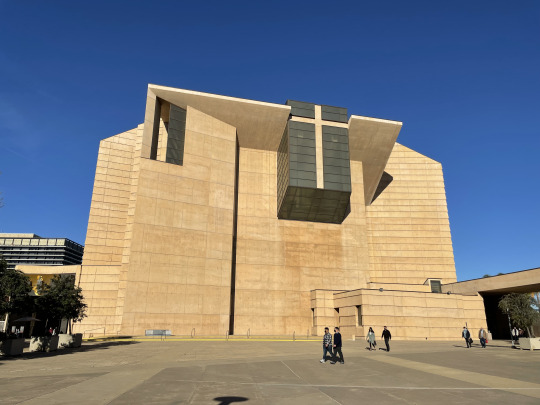
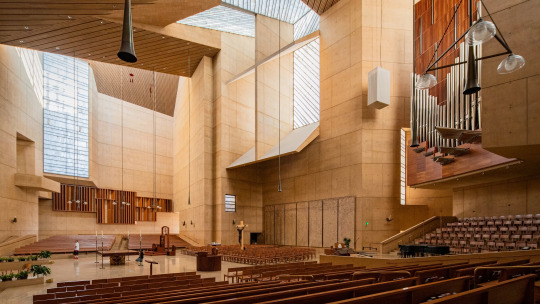

maybe it's because i was raised catholic but churches shouldn't look like furniture stores
#right on queue#long post#which let me be clear is a gorgeous building#full of gorgeous art#maintaining some lovely gardens around it#but it really DOES look like someplace you'd want to shelter#in the case of a nuclear devil attack
45K notes
·
View notes
Note
Barns chart???
Ooooh!! Interesting! Sure thing! :D
Barnes Relationship chart!!
Guest 1337: "Their kind doesn't need your defense."(Tension)
Monica: "Tell your GUARD DOG of a husband to FUCK OFF."(Tension)
007n7: "Disgusting beast."(Hated)
C00lkidd: "Get away from me, you asthmatic blood clot."(Hated)
Builderman: "Nothing is going on here. Everything is fine in our workplace."(Neutral)
Orion: "Not so holy now, are we?"(Tension)
Shedletsky: "A coward hiding behind swords."(Tension)
Doombringer: "Ah, a past viewer!"("Friendly")
Doombringer(Post break): "...good lord..."(Feared)
Reaper: "Ahh, a dedicated viewer! Grown up and much more of a coward..."(Tension)
Dutch: "What the fuck are you."(Hated)
Boss: "Pardon my staring. She was so beautiful..."(Tension)
Strawbz: "You tuned in when your world was in chaos. Our show was a sense of comfort."(Neutral)
Charlie: "I cannot say the word, but I know what you are."(Tension)
Telamon: "I am absolved of my sins, as you have done worse, oh Lord."(Worshipped)
Batty: "Pathetic whelp. Your family abandoned you because you are a monster."(Hated)
Ro.blx: "A worthy machine of judgement."(Respected)
1x1x1x1: "Ew."(Tension)
John Doe: "Stop being so friendly."(Hated)
Daisy: "...Stress relief potion."(Neutral)
Shellzy: "...big strong lady."(Friendly?)
Vivian: "Gorgeous...Like a living cathedral..."(Enamoured)
Jane Doe: "Tell your brother to stop being so nice."(Tension)
Lilith: "Stay with your books."(Neutral)
Madam: "so pretty...so perfect..."(Enamoured)
“Friend”: "Who is this? Why should I care?"(Neutral)
Elliot: "I prefer chinese."(Neutral)
Lucy: "Haven't seen your kind in a while."(Neutral)
Noli: "Fucking freak."(Hated)
Biz: "Get back in line."(Hated)
Sergei: "You don't scare me."(Tension)
Captain: "I saw you in the mall once."(Neutral)
Angel: "Go outside."(Tension)
Constantine: "Boom."(Tension)
Hopper: "Where are your parents? Wait...right. You're an adult. I forgot. What with your stature and all."(Tension)
Magnolia: "The nurse assigned for Biz. Wish they didn't give it one, but oh well."(Friendly)
Delaney: "Biz was only telling you of nightmares."(Tension)
0 notes
Text
Southern Californians remember Pope Francis at Memorial Mass in downtown L.A.
Los Angeles Archbishop José H. Gomez celebrated a Memorial Mass on Friday, April 25, at the Cathedral of Our Lady of the Angeles in downtown to honor the life and ministry of Pope Francis. The liturgy was held in anticipation of the pope’s funeral in Rome on Saturday. It drew auxiliary bishops, local clergy, elected officials, consul generals, interfaith leaders and parishioners, who gathered to…
0 notes